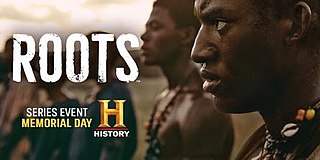
The economy of the Gambia is heavily reliant on agriculture. The Gambia has no significant mineral or other natural resources, and has a limited agricultural base. About 75% of the population depends on crops and livestock for its livelihood. Small-scale manufacturing activity features the processing of peanuts, fish, and animal hides.

Alexander Murray Palmer Haley was an American writer and the author of the 1976 book Roots: The Saga of an American Family. ABC adapted the book as a television miniseries of the same name and aired it in 1977 to a record-breaking audience of 130 million viewers. In the United States, the book and miniseries raised the public awareness of black American history and inspired a broad interest in genealogy and family history.

The Gambia River is a major river in West Africa, running 1,120 kilometres (700 mi) from the Fouta Djallon plateau in north Guinea westward through Senegal and The Gambia to the Atlantic Ocean at the city of Banjul. It is navigable for about half that length.

The Mandinka or Malinke are a West African ethnic group primarily found in southern Mali, The Gambia, southern Senegal and eastern Guinea. Numbering about 11 million, they are the largest subgroup of the Mandé peoples and one of the largest ethnolinguistic groups in Africa. They speak the Manding languages in the Mande language family, which are a lingua franca in much of West Africa. Virtually all of Mandinka people are adherent to Islam, mostly based on the Maliki jurisprudence. They are predominantly subsistence farmers and live in rural villages. Their largest urban center is Bamako, the capital of Mali.

Kunta Kinteh Island, formerly called James Island and St Andrew's Island, is an island in the Gambia River, 30 km (19 mi) from the river mouth and near Juffureh in the Republic of the Gambia. Fort James is located on the island. It is less than 3.2 km from Albreda on the river's northern bank. As an important historical site in the West African slave trade, it is listed as a UNESCO World Heritage Site, together with related sites including a ruined Portuguese chapel and a colonial warehouse in Albreda, the Maurel Frères Building in Juffureh, and Fort Bullen and Six-Gun Battery, which are located at the mouth of the Gambia River.

Roots is a 1977 American television miniseries based on Alex Haley's 1976 novel Roots: The Saga of an American Family, set during and after the era of enslavement in the United States. The series first aired on ABC in January 1977 over eight consecutive nights.

Kunta Kinte is a fictional character in the 1976 novel Roots: The Saga of an American Family by American author Alex Haley. Kunta Kinte was based on one of Haley's ancestors, a Gambian man who was born around 1750, enslaved, and taken to America where he died around 1822. Haley said that his account of Kunta's life in Roots is a mixture of fact and fiction.

Roots: The Saga of an American Family is a 1976 novel written by Alex Haley. It tells the story of Kunta Kinte, an 18th-century Mandinka, captured as an adolescent, sold into slavery in Africa, and transported to North America. It explores his life and those of his descendants in the United States, down to Haley. The novel was quickly adapted as a hugely popular television miniseries, Roots (1977). Together, the novel and series were a cultural sensation in the United States. The novel spent forty-six weeks on The New York Times Best Seller list, including twenty-two weeks at number one.

Albreda is a historic settlement in the Gambia on the north bank of the Gambia River, variously described as a 'trading post' or a 'slave fort'. It is located near Jufureh in the North Bank Division and an arch stands on the beach connecting the two places. As of 2008, it has an estimated population of 1,776.

Barra, traditionally known as Niumi, is a city in The Gambia, located in the district of Lower Niumi. The predominant languages of the city are Serer and Wolof.

Islam is the major religion in the Gambia, representing 97% of the 2 million population, with the first Muslim communities in the country arriving in 11th century. Islam has therefore had an influence on the Gambia throughout history, and continues to impact its culture, society and politics. The majority of The Gambia's Muslims are Sunni belonging to the Maliki school of jurisprudence, influenced with Sufism. There is a smaller Shiite community, largely stemming from Lebanese and Arab migration. The Ahmadiyya movement is also present. Other religious societies exist in the country, including Catholics, Protestants, Hindus and Traditional African religions.

Roots: The Next Generations is an American television miniseries based on the last seven chapters of Alex Haley's 1976 novel Roots: The Saga of an American Family. First aired on ABC in February 1979, it is a sequel to the 1977 Roots miniseries, tracing the lives of Kunta Kinte's descendants in Henning, Tennessee, from 1882 to 1967.
The tourism industry today in the Gambia started when a party of 300 Swedish tourists arrived in 1965. That pioneering trip was organised by a Swede named Bertil Harding together with the tour operators Vingresor. It was seen as an ideal place to escape the harsh winter months of Scandinavia where Europeans would enjoy not only sun, sand and beaches but also experience the excitement of a real African holiday. It also offered a new opening for an affordable holiday to increasing numbers of traveling Europeans.
The Niominka people are an ethnic group in Senegal living on the islands of the Saloum River delta. They are currently classified as a subgroup of the Serer.

Circular reporting, or false confirmation, is a situation in source criticism where a piece of information appears to come from multiple independent sources, but in reality comes from only one source. In many cases, the problem happens mistakenly through sloppy reporting or intelligence-gathering. However, the situation can also be intentionally contrived by the source or reporter as a way of reinforcing the widespread belief in its information.

Alieu Ebrima Cham Joof commonly known as Cham Joof or Alhaji Cham Joof, was a Gambian historian, politician, author, trade unionist, broadcaster, radio programme director, scout master, Pan-Africanist, lecturer, columnist, activist and an African nationalist who advocated for the Gambia's independence during the colonial era.
Lord Ligonier was an 18th-century British slave ship built in New England that unloaded enslaved Africans in Annapolis, Maryland in 1767. The ship was made famous by Alex Haley's novel, Roots: The Saga of an American Family, in which it brought his ancestor, Kunta Kinte, from The Gambia to the colonial United States.

Roots is a 2016 American miniseries and a remake of the 1977 miniseries with the same name, based on Alex Haley's 1976 novel, Roots: The Saga of an American Family, which follows an African man who is shipped to North America as a slave and his descendants. It first aired on May 30, 2016, and stars Malachi Kirby, Forest Whitaker, Anna Paquin, Laurence Fishburne, Jonathan Rhys Meyers, Anika Noni Rose, T.I. and South African actress Nokuthula Ledwaba. It was produced on a budget of $50 million.
The Barra War, also known as the Anglo-Niumi War or the British-Barra War, was a military conflict that lasted from 1831 to 1832 between forces of the British Empire and the Kingdom of Niumi, in what is now The Gambia.

The Kingdom of Niumi, also known as the Kingdom of Barra, was a West African nation at the Gambia River. Niumi was located at the mouth of the river, and extended nearly 60 kilometres (40 mi) along and north of its north bank. For much of its existence, its eastern border was occupied by the Kingdom of Baddibu, and its northern border was open savanna leading to Senegal. Formally becoming part of the Gambia Colony and Protectorate in 1897, the Kingdom now forms the Upper Niumi and Lower Niumi districts of the North Bank Division in The Gambia.

















